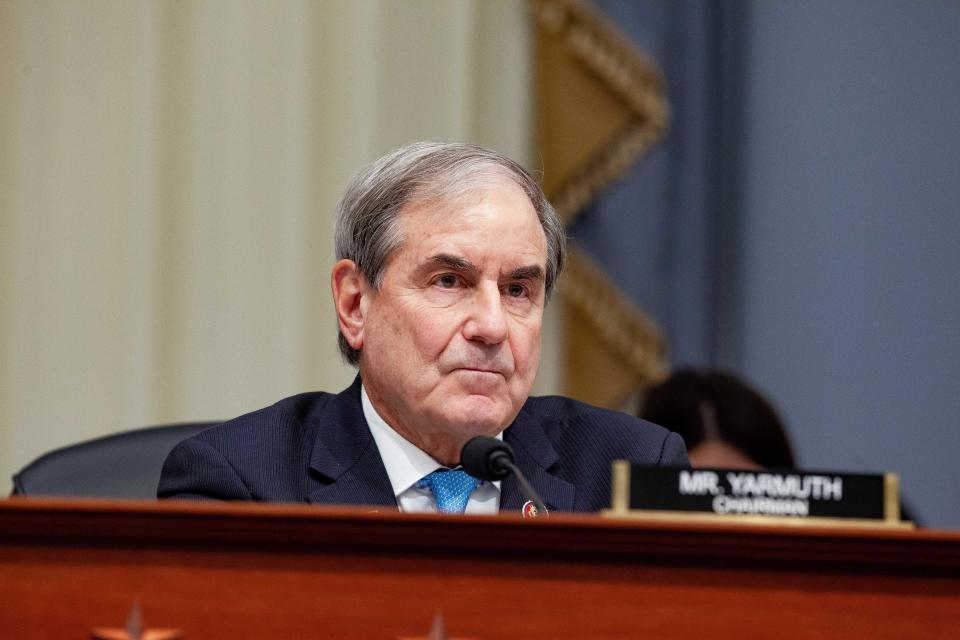Democrats Consider Abandoning Budget Floor Vote
WASHINGTON ― A day after the Trump administration released its budget blueprint and lawmakers essentially deemed the document “dead on arrival,” House Democrats are facing their own budget woes as leaders weigh whether to put their spending roadmap up for a vote on the floor.
Budget Chairman John Yarmuth (D-Ky.) told HuffPost on Tuesday that Democrats are still deciding if they’ll place their yet-to-be-released budget on the House floor and potentially put vulnerable members to a tough spot: Vote for a document that Republican challengers could hammer you for, or vote against it and potentially sink Democratic chances of adopting a budget.
While voting yes could cause individual headaches on the campaign trail, voting against the budget and letting it sink would feed into stories of Democratic dysfunction and make the lack of a budget even more of a story ― whereas only the most vigilant Congress-watchers would ever actually notice Democrats not putting a budget up for a vote. (Republicans themselves didn’t vote on a budget last year on the floor when they were in the majority, and no one seemed to ever say anything about it.)
Part of the reason Democrats are considering not voting on a budget is because budgets don’t become law. They are little more than a glorified press release in a divided government, and with the government running $1 trillion deficits for the foreseeable future, there’s little to be gained by either trying to balance the budget by cutting programs or by endorsing those deficits by continuing spending.
Still, Yarmuth suggested House Speaker Nancy Pelosi (D-Calif.) and other leaders are deferring to him on the matter.
“Leadership has basically said it’s the Budget Committee’s decision, so we’re going to talk about it,” Yarmuth said.

He added that the big consideration was whether Democrats would have enough votes to adopt their budget ― 217 votes for a majority ― and he said it was a decision Budget Committee Democrats intended to reach in the next 10 days. The Democrats have 235 House members and therefore could lose 18 and still adopt the budget. (There are currently three House vacancies.)
A Democratic leadership aide told HuffPost on Tuesday that leaders met with Yarmuth on Monday and discussed whether they would put the budget up for a vote but that there hadn’t been a final determination, as Politico first reported Monday night.
Adopting a budget would do little to resolve the obstacles lawmakers face in funding the government. Republicans and Democrats have yet to agree on major defense and non-defense spending numbers this year, and those appropriations discussions are entirely separate from budget negotiations. And while not adopting a budget comes with its own set of public relations problems that could complicate Democratic re-election efforts, there aren’t any practical ramifications for not putting a budget on the floor.
On the political side, however, Democrats have all sorts of considerations. The Democratic budget isn’t expected to balance in any time frame. And, although the Trump budget achieves “balance” in 15 years only by using a slate of budgetary gimmicks and cutting popular programs like Medicare and Medicaid, Republicans will be certain to slam Democrats for massive deficits ― even if it’s legislation like the GOP’s tax law that is partly to blame for the deficit and the Republican remedy is to cut popular entitlement programs.
There are also potential problems on the left if Democrats put forward a budget for a vote. The proposal that the Budget Committee is expected to offer is unlikely to include policies like the Green New Deal or “Medicare for All.” And more moderate members may oppose the blueprint if it increases taxes or cuts military spending.
“We have some members who don’t want to vote for any revenue increases,” Yarmuth told HuffPost on Tuesday. “We have some people who want to cut defense spending. You know, it’s hard to thread the needle.”
But even if Democrats ultimately decide not to put their budget on the floor, they do plan to release the document and vote for it in the Budget Committee. That could still open Democrats up to criticism from the right and give progressives an opportunity to propose a more ambitious budget that would balloon government spending ― once again giving Republicans an opportunity to try to divide Democrats.
Whichever way leaders go on a floor vote, the Budget Committee is trying to put forward a document that could win as many Democrats as possible. And even if that blueprint isn’t exactly to the liking of all members, some Democrats believe leadership should put the budget on the floor anyway.
“We need to have a proactive vision for our policies,” Ro Khanna (D-Calif.), a Budget Committee member who is also one of the most progressive members in Congress, told HuffPost on Tuesday. “And obviously there’s a temptation to just show the flaws of the Trump proposal, but that doesn’t mean we don’t have a responsibility to put forward our ideas.”
Love HuffPost? Become a founding member of HuffPost Plus today.
This article originally appeared on HuffPost.

